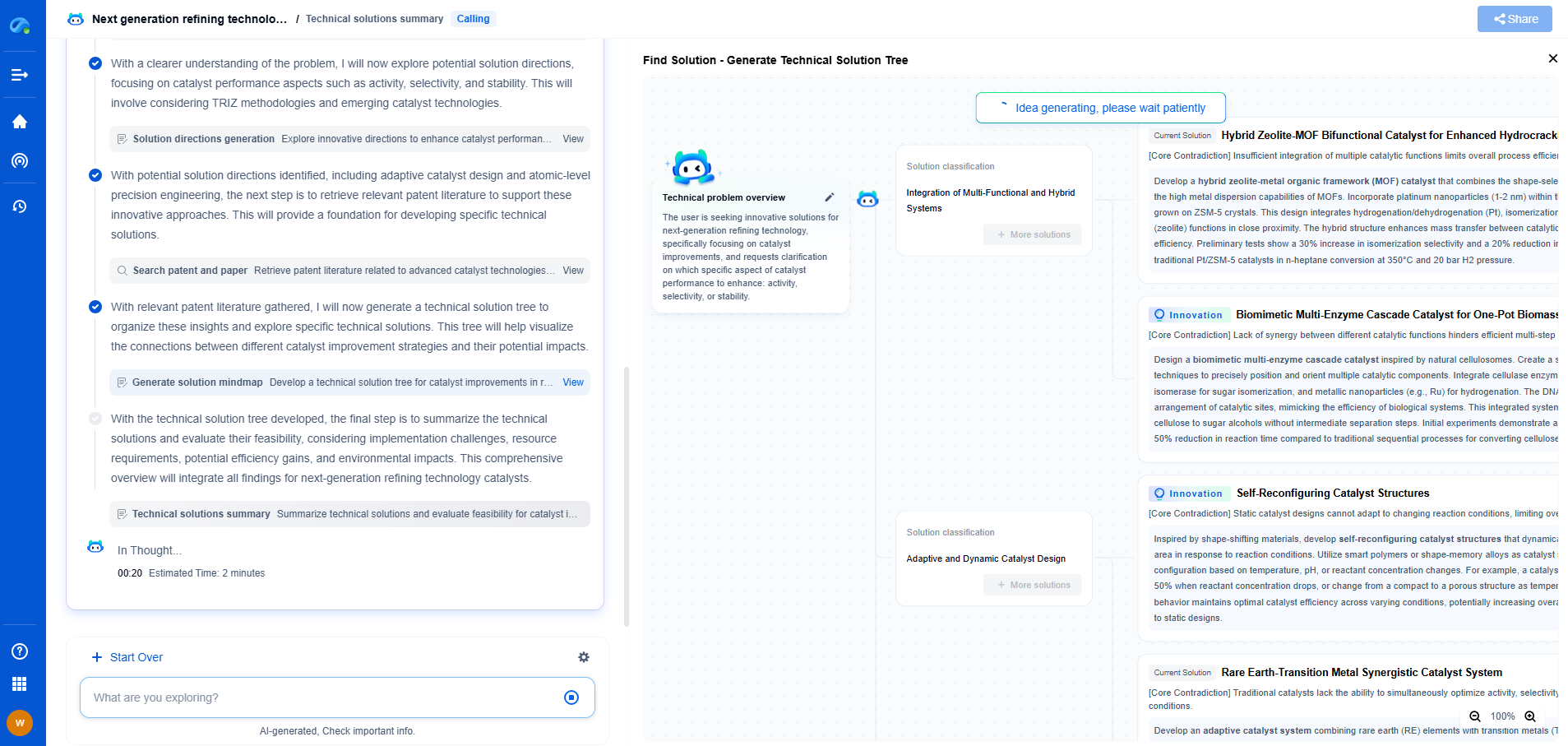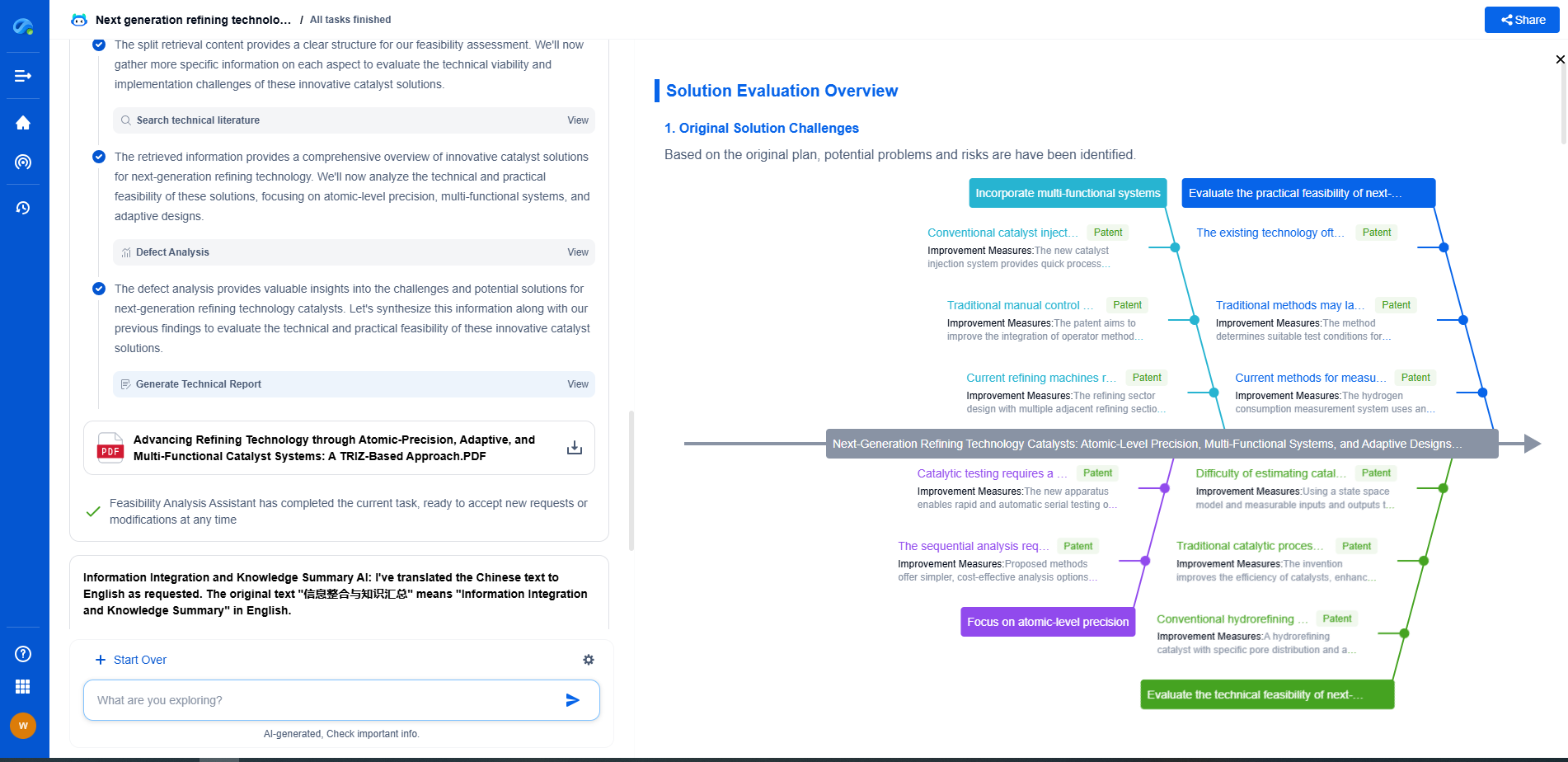AI-Based Control Agent vs Traditional Control Algorithms: Which One Is More Efficient?
JUL 2, 2025 |
In the world of automation and systems engineering, the efficiency of control systems is paramount. Whether it's in manufacturing, robotics, or even aerospace, the ability to regulate and optimize system performance is critical. Traditionally, control systems have relied on well-established algorithms like PID (Proportional-Integral-Derivative) controllers to manage these tasks. However, with the advent of artificial intelligence, AI-based control agents are increasingly being used as alternatives. This article delves into the efficiency of AI-based control agents compared to traditional control algorithms.
Traditional Control Algorithms: The Backbone of Automation
Traditional control algorithms, such as PID controllers, have been the cornerstone of industrial automation for decades. Their design is rooted in linear control theory, which makes them highly reliable for systems with predictable behavior. These algorithms are characterized by their simplicity, ease of implementation, and robustness. PID controllers, for example, work by continuously calculating an error value as the difference between a desired setpoint and a measured process variable, applying corrections based on proportional, integral, and derivative terms.
The main advantage of traditional algorithms is their deterministic nature. Engineers can predict their behavior and performance, making them suitable for systems where precision is crucial. However, these algorithms can struggle in complex, non-linear systems or environments with a high degree of uncertainty. Their performance also highly depends on proper tuning, which can be a time-consuming and iterative process.
The Rise of AI-Based Control Agents
AI-based control agents, such as those using machine learning algorithms, are transforming how control systems are designed and implemented. These agents leverage data-driven models to learn and adapt to system dynamics, offering a level of flexibility that traditional algorithms lack. Techniques such as reinforcement learning allow AI agents to autonomously improve their control strategies by interacting with the environment and receiving feedback.
One significant advantage of AI-based control is their ability to handle complex, high-dimensional problems that are beyond the scope of traditional methods. They can adapt to changes in the system or the environment without requiring manual retuning, making them ideal for applications where conditions are constantly evolving. Additionally, AI agents can optimize multiple objectives simultaneously, providing a more holistic approach to control.
Efficiency Comparison
When comparing efficiency, it's crucial to define the metrics of interest. Efficiency can refer to computational efficiency, the ability to reduce energy consumption, or the speed at which a system reaches its desired state. In terms of computational efficiency, traditional algorithms typically require fewer resources, as they are less complex and do not involve extensive data processing.
However, AI-based control agents can outperform traditional methods in terms of the quality of control and adaptability. In environments where the system dynamics are not well understood or are subject to frequent changes, AI agents can provide more accurate and responsive control. Their ability to learn from data allows them to optimize control strategies in real-time, potentially leading to better overall system performance.
Challenges and Considerations
Despite their advantages, AI-based control agents come with their own set of challenges. They require large amounts of data to train effectively, and the quality of control heavily depends on the quality of the data. Moreover, their "black-box" nature can be a drawback, as it becomes difficult to interpret how decisions are made, which can be a concern in safety-critical applications.
On the other hand, traditional control algorithms offer transparency and ease of understanding, making them more suitable for applications where traceability and predictability are essential. These algorithms also benefit from decades of engineering experience and are supported by a wealth of theoretical knowledge.
Conclusion
The decision between AI-based control agents and traditional control algorithms should be guided by the specific requirements of the application. While AI-based control offers remarkable adaptability and efficiency in complex and dynamic environments, traditional algorithms provide reliability and simplicity in well-understood systems. As technology advances, a hybrid approach that leverages the strengths of both methods may offer the most efficient solution, combining the robustness of traditional algorithms with the adaptability of AI-based control agents. Ultimately, the choice boils down to the nature of the control problem, available resources, and the desired outcomes.
Ready to Reinvent How You Work on Control Systems?
Designing, analyzing, and optimizing control systems involves complex decision-making, from selecting the right sensor configurations to ensuring robust fault tolerance and interoperability. If you’re spending countless hours digging through documentation, standards, patents, or simulation results — it's time for a smarter way to work.
Patsnap Eureka is your intelligent AI Agent, purpose-built for R&D and IP professionals in high-tech industries. Whether you're developing next-gen motion controllers, debugging signal integrity issues, or navigating complex regulatory and patent landscapes in industrial automation, Eureka helps you cut through technical noise and surface the insights that matter—faster.
👉 Experience Patsnap Eureka today — Power up your Control Systems innovation with AI intelligence built for engineers and IP minds.
- R&D
- Intellectual Property
- Life Sciences
- Materials
- Tech Scout
- Unparalleled Data Quality
- Higher Quality Content
- 60% Fewer Hallucinations
Browse by: Latest US Patents, China's latest patents, Technical Efficacy Thesaurus, Application Domain, Technology Topic, Popular Technical Reports.
© 2025 PatSnap. All rights reserved.Legal|Privacy policy|Modern Slavery Act Transparency Statement|Sitemap|About US| Contact US: help@patsnap.com

